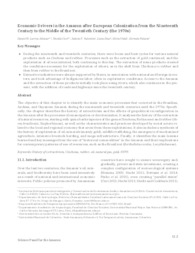Economic drivers in the Amazon from the 19th century to the 1970s.
Economic drivers in the Amazon from the 19th century to the 1970s.
Author(s): LARREA-ALCÁZAR, D. M.; CUVI, N.; VALENTIM, J. F.; DIAZ, L.; VIDAL, S.; PALACIO, G.
Summary: The objective of this chapter is to identify the main economic processes that occurred in the Brazilian, Andean, and Guyanese Amazon during the nineteenth and twentieth centuries until the 1970s. Specifically, the chapter describes the history of extractivism and the effects of geopolitical reconfiguration in the Amazon after the processes of emancipation or decolonization. It analyses the extractive history based on quina barks (species of the genus Chinchona, Rubiaceae) and rubber (Hevea brasiliensis, Euphorbiacae), as well as the characteristics and practices developed by social actors related to the local and regional economy that arose from these exploitations. It also includes a synthesis of the history of the emergence of the extractive economy based on the exploitation of oil, minerals (mainly gold), and the beginning of wildlife trafficking and the basis for the emergence of mechanized agriculture, intensive livestock herding, and mega-infrastructure, among others. Finally, it identifies the main lessons learned and key messages from the use of "historical commodities" in the Amazon and their implications in contemporary patterns of use of other resources in the Amazon, such as the Brazil nut (Bertholletia excelsa, Lecythidaceae).
Publication year: 2021
Types of publication: Book sections
Unit: Embrapa Acre
Observation
Some of Embrapa's publications are published as ePub files. To read them, use or download one of the following free software options to your computer or mobile device. Android: Google Play Books; IOS: iBooks; Windows and Linux: Calibre.
Access other publications
Access the Agricultural Research Database (BDPA) to consult Embrapa's full library collection and records.
Visit Embrapa Bookstore to purchase books and other publications sold by Embrapa.

